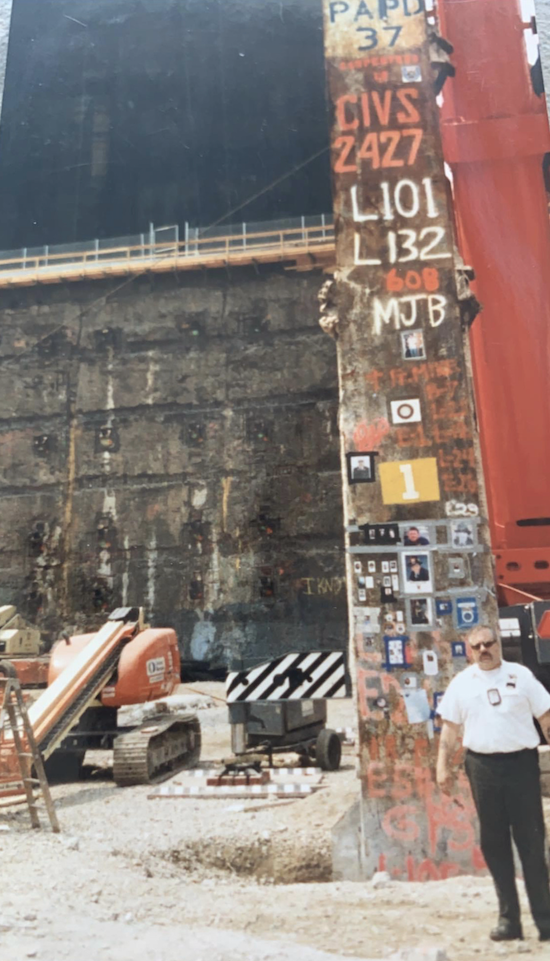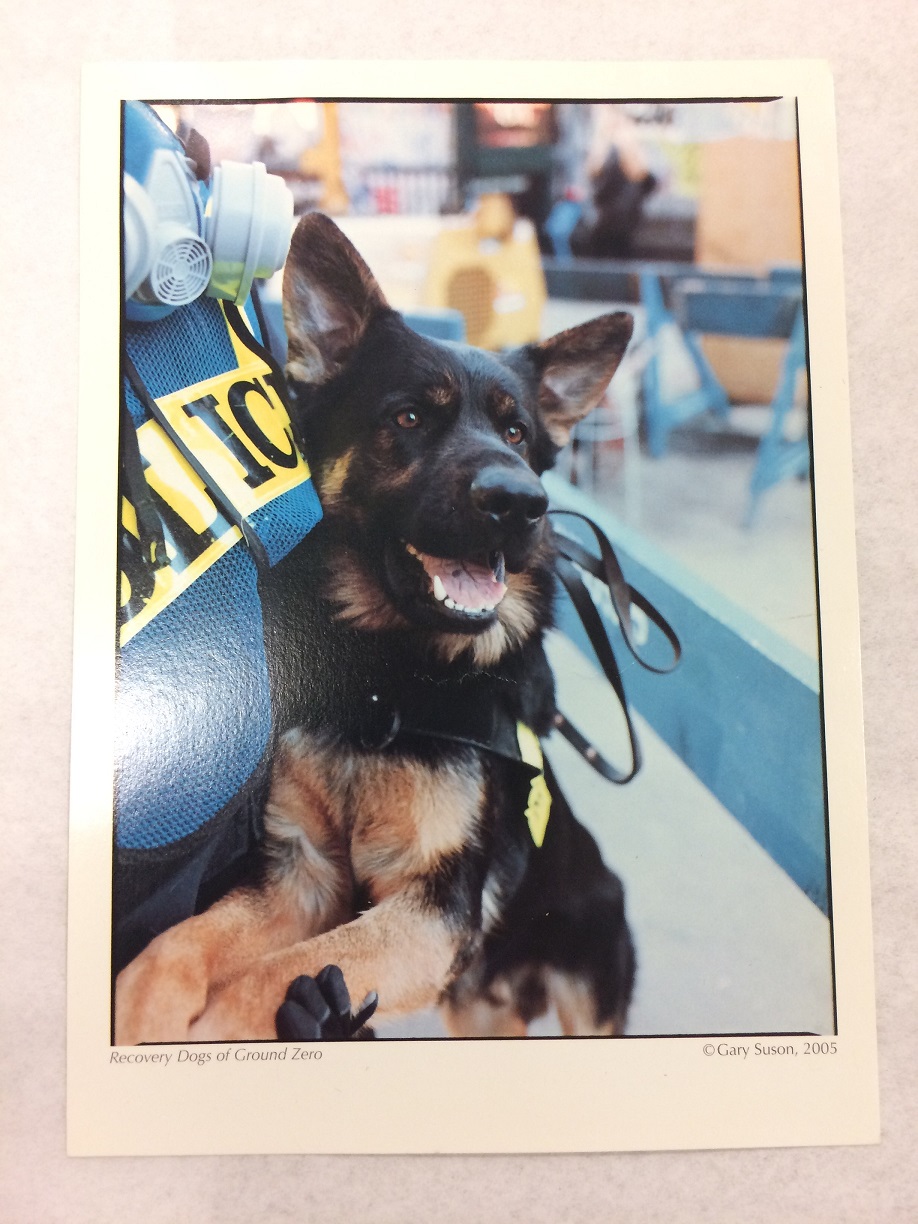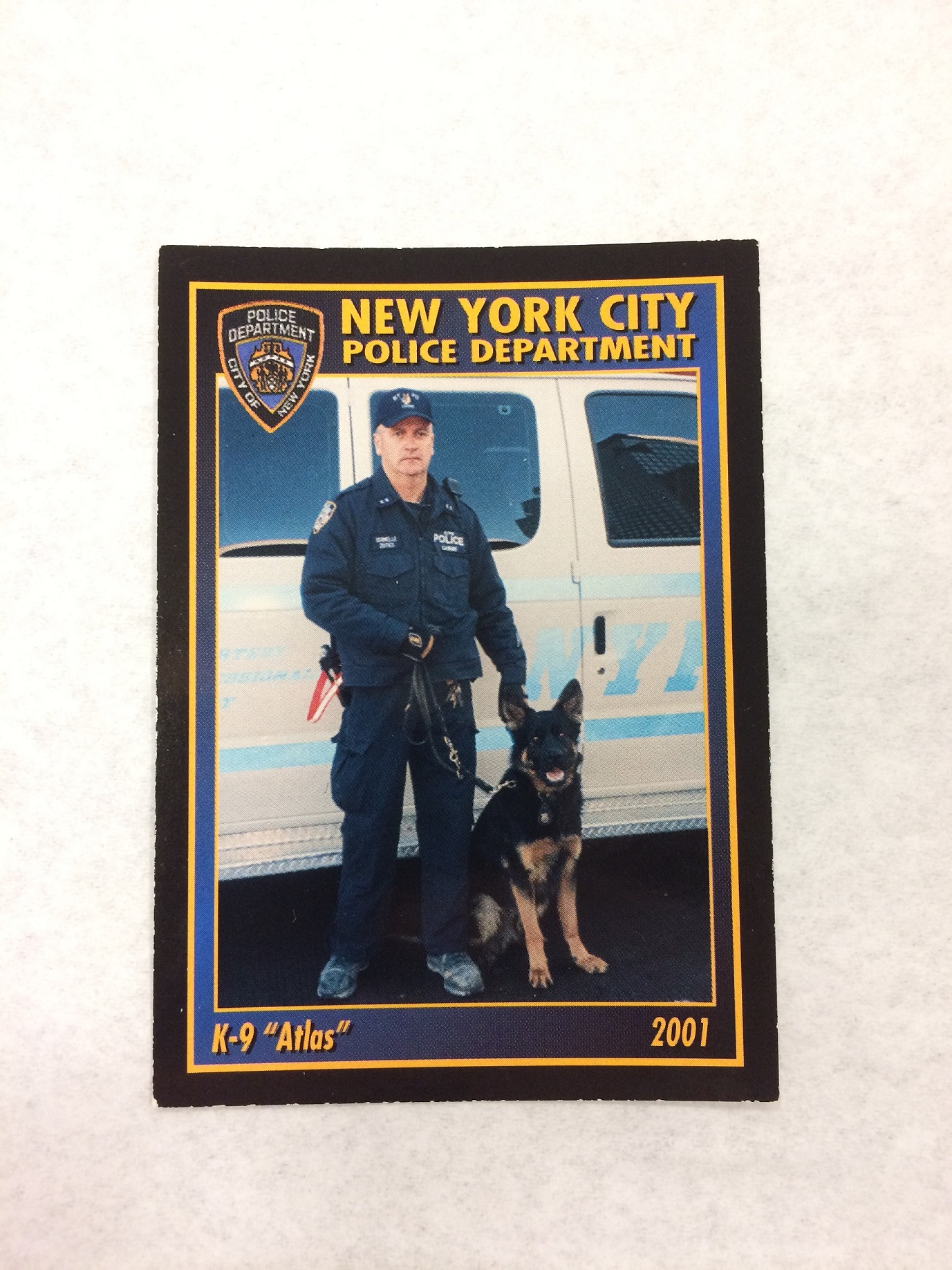Make a donation to the museum
Rescue & Recovery at 20: Bob Schnelle & Atlas, NYPD
Rescue & Recovery at 20: Bob Schnelle & Atlas, NYPD
- May 20, 2022
Left: Postcard featuring photograph of Atlas by Gary Suson, 2005. Right: NYPD trading card featuring photo of Robert (Bob) Schnelle and Atlas, 2001.
We're just over a week out from May 30, the 20th anniversary of the formal end to rescue and recovery efforts at Ground Zero. Today, we continue our look at rescue, recovery, and relief workers - both human and canine - in recognition of their tireless efforts, sacrifice, and spirit.
The following Q&A features Robert (Bob) Schnelle, who served along with his rescue dog Atlas in the NYPD on and after 9/11.
Where were you on 9/11?
I was in Bayside, Queens, where the NYPD K-9 Unit was based. I stepped out for a cup of coffee and suddenly my radio was going crazy. Everyone reported that a plane went into the World Trade Center, so I rushed there as fast as I could. On my way, the second plane hit, but I couldn’t see the towers, so I didn’t understand how bad it was. When I arrived on scene, I finally understood the scope of it.
I wasn’t a firefighter, but I knew I could help evacuate people. At the time, I had a dog with me, Atlas. I couldn’t bring Atlas, so I put the AC on for him, rolled the window down and went to help. As I was walking away from the car, the first tower came down. I ducked under someone’s truck as the debris fell. I ran back to the car to get Atlas, because I knew I couldn’t leave him in the car after that. Together, we went to start helping people out. That’s when the second tower started to come down. I remember running for my life, I grabbed the dog, and we ran.
I thought about letting Atlas go. I knew he could run faster than me, and maybe he could outrun this because I didn’t know if I would be able to. I thought that he could survive, and I just had to hope I would see him again some time. He helped me though, he was a young dog, and he was helping pull me faster. It was a run for your life situation.
Afterwards, I found someone from the police department. The radios didn’t work, we didn’t know where anyone was, or who was alive. We found a few firemen and decided to go on our own to try and help people. Eventually, I found a high-ranking person and they got us to re-group and come up with a plan to start looking for people. We had to come up with a plan before searching, because if you went into the pile alone and nobody knew, nobody would’ve known if you didn’t come back.
At some point, I was assigned to start searching WTC 7. I had a bad feeling. A sergeant told me he felt the same thing. The six of us in our search team gave ourselves 15-20 minutes, and we agreed if we didn’t find anyone in that time we would leave. There were fires everywhere in the building and we just felt something eerie. I don’t think we were out of there for more than an hour before the building collapsed.
When I got back to where I had parked my car, I was glad I chose to bring Atlas. The windows were blown out, things were crushed. I doubt he would’ve survived if I left him there.
What role did you and Atlas play in the rescue, recovery, and relief efforts?
For the first few weeks, we were doing 12-hour shifts, almost non-stop. A mobile veterinary [clinic] was set up for the dogs. We would bring them there so they could fix their pads, clean their eyes out, put IVs in the dogs to hydrate them. The dogs were working hard. We were taking a beating with safety equipment, but the dogs had nothing. Nothing on their feet, nothing for their breathing. It was amazing that they were able to perform. I’m sure Atlas was traumatized by surviving that first day. Even then, he re-focused to help people. I was proud of him. Some of the dogs shut down on their handlers, they just couldn’t do it.
At some point, the decision had to be made to switch from rescue to recovery. That was hard to hear. You always hope you can find someone tucked away, safely, in a pocket of air. With the fires burning, you knew it wasn’t the case, but you had to hope. After we made that switch, we started to scale back. We rotated people out to make sure they were staying safe. We were there until May.
Can you describe the bond between you and Atlas?
Atlas was my partner. I spent every day with him. I was with him more than I was with my family during that time. He was a good dog. At one point, I had to start telling people to leave him alone. I didn’t want to be rude, but he was exhausted. He was such a nice dog that people wanted to be around him. The dogs were really helping emotionally. He was a search and rescue dog and a therapy dog. He was giving help to those who were having breakdowns. My other dog Zeus, and Atlas, were both so good at helping people.
What does May 30th mean to you?
I did talk about 9/11 a lot, so I didn’t internalize as much. People think I’m cold to it, and I’m not. I went through it, I survived it, and I mourn the people we lost, but I can’t reflect on it every day. The anniversaries are hard for me. I’ll always reflect on those days, and they are hard for me to get through. I watch the ceremonies, reflect, say a prayer, and try to spend the day by the ocean.
Do you/did Atlas have any health issues connected to your time at Ground Zero?
I was told to join the WTC Health Program early. They told me that I could never imagine what I could get years down the road. I do have esophagus issues, GERD, asthma, and breathing issues. I consider myself healthy when compared to the other people who are suffering.
Atlas died from cancer in 2008, at 10 years old.
To the generation who is growing up with no memory of September 11th, why is it important to share your story and the stories of others with them?
I heard it’s being taught in high schools as part of history lessons. It’s part of their curriculum. It took years, but it’s history now. I’m a history buff, like Pearl Harbor. They think “How did Pearl Harbor happen?” and we do the same thing with 9/11. How did this happen? I just hope it never happens again, here, or anywhere. Sometimes I wish we could go back to 9/10 and none of this happened. But it did, and here we are. We deal with it and we move on. We just do the best with it.
Anything else you’d like to add?
In February of 2003, Atlas and I were invited to the Westminster Dog Show. This show is made for the elite of the dogs, not police dogs. We get there with these police dogs, these rough and tough German Shepherds. Normally, we wouldn’t be let in Madison Square Garden, much less be honored. We did it because money was being donated to search and rescue for it. Normally, the next morning, the Westminster dog is honored on TV. When we were backstage that night, my boss told me that Good Morning America would like to interview us, live, in Times Square. I think they even put make-up on me that morning. Atlas was so good, the lights were blinding, but he just sat there. I think he even fell asleep at the end. I was getting calls all day from people telling me they saw me on TV. Of course, they all say, “The dog looked really good.” Nothing about me, just Atlas.
Compiled by Caitlyn Best, Government and Community Affairs Coordinator
See Also:
CBS News: The Story of Atlas
K-9 Courage: The Working Dogs of 9/11
Previous Post
Ukraine Close to Our Hearts on International Museum Day
We marked International Museum Day with a special Survivor Tree lighting ceremony in support of our museum colleagues and the people of Ukraine.
Next Post
Rescue & Recovery at 20: Sal Annerino, DSNY

Salvatore (Sal) Annerino was a district superintendent for the New York City Department of Sanitation on 9/11, then spent the next nine months at the site. Ahead of the 20th anniversary of the formal end to rescue and recovery efforts at Ground Zero, Annerino answers a Q&A for us about his personal memories and experiences in that uniquely horrific situation.

